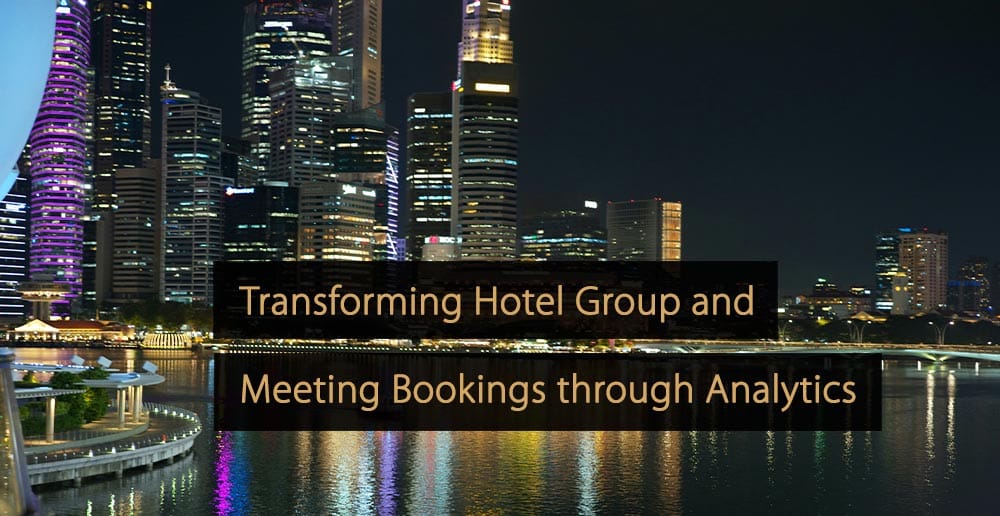Data is the backbone of modern hospitality and relying on outdated, fragmented systems can be a recipe for disaster, especially in managing group and meeting bookings. If your hotel is not harnessing the full potential of integrated data management, you are jeopardizing the guest experience. Disjointed platforms can lead to miscommunications, missed opportunities and operational chaos. By leveraging analytics, you can streamline operations, make informed decisions, and provide exceptional experiences for meeting organizers and participants.
This article explores how integrated data management can become your hotel’s greatest asset, delivering the insights needed for smarter decisions and a more memorable guest experience.
The Importance of Integrated Data for Hotels
Managing guest experiences effectively hinges on your ability to access and analyze data. Many hotels still operate with outdated, disjointed systems that lead to confusion and inefficiencies. Think of an event at your hotel with tens of groups and hundreds of guests checking in at the same time, only to find that their room bookings have not been properly communicated to the front desk—an experience that can damage your hotel’s reputation and leave the guests feeling frustrated.
Integrated data systems eliminate these pitfalls by centralizing all information, from booking details to customer preferences. This means when a group arrives for a conference, your staff can easily access their rooming lists and special requests without sifting through multiple platforms.
Moreover, tracking data on cancellation patterns can inform proactive strategies to retain bookings. A spike in cancellations during certain seasons allows you to adjust their marketing approaches or offer flexible booking options to entice guests.
Ultimately, integrated data management is a shift in how you connect with your guests and streamline operations. Leveraging real-time insights, enables you to make informed decisions that enrich the guest experience and improve your bottom line.
Key Data Points to Track in Hotel Operations
Understanding the role of data management in hotels impacts both operational efficiency and guest satisfaction. Effectively tracking and analyzing key data points allows hotels to pinpoint trends, optimize resources, and increase profitability. To help you assess your current data management practices, consider the following questions:
How Quickly Are You Addressing Guest Inquiries?
Tracking response times directly influences booking conversion rates. A delayed response can cost you a potential reservation, as guests are likely to turn to competitors who can provide faster service. Regularly analyzing this data allows you to identify communication bottlenecks and implement strategies that promote responsiveness.
Are You Aware of Your Guests’ Booking Habits?
Examining booking sizes and lead times helps you prioritize inquiries and allocate staffing more effectively. Recognizing trends – such as peak times for group bookings versus individual reservations – enables you to anticipate busy periods and adjust your resources accordingly.
What Are the Common Reasons for Cancellations at Your Hotel?
Monitoring cancellation patterns enables proactive management and informed decision-making. Understanding the factors behind cancellations – it could be that they stem from pricing, changes in plans, or dissatisfaction – can inform strategies to reduce them. Implementing flexible cancellation policies or targeted marketing efforts can help re-engage guests.
How Cohesive Is Your Booking System?
Centralizing all booking-related information within a single platform is fundamental for data integrity and minimizing operational friction. Managing reservations across various systems can lead to discrepancies and confusion. Centralising your booking data ensures you have a comprehensive and accurate view of all reservations.
Are You Tracking where Potential Guests Drop off during the Booking Process?
Monitoring customer interactions on your booking platforms reveals pain points in the user experience. Recognizing areas where guests disengage – such as complicated forms or insufficient information – allows you to refine your booking funnel and significantly boost conversion rates.
Leveraging AI and BI Tools for Decision-Making
The hospitality industry is rapidly evolving, and data management is at the forefront of this transformation. Harnessing AI and business intelligence (BI) tools empowers hotels to take action that improves operations.
AI-Powered Insights
AI has the potential to revolutionize your group booking pricing strategies. Advanced algorithms analyze market trends, competitor rates, and group booking patterns in real-time, allowing you to adjust prices dynamically based on demand fluctuations. For instance, a large conference or event nearby triggers AI to automatically adjust group room rates to maximize revenue during peak times.
AI can also identify periods of low demand for group bookings and suggest tailored promotional offers to attract event organizers, helping to maintain group occupancy rates even in quieter seasons. Effectively leveraging your venue’s data for real-time group pricing decisions can significantly improve outcomes, making investing in AI a strategic move worth considering.
Compiling sales and purchase data through a single platform opens up new possibilities for AI to utilize this information more efficiently. Metrics like lead time and other purchase timelines, which were non-existent until a few years ago, now provide critical insights. This enables AI to make more accurate forecasts and suggests strategic actions to optimize group booking performance.
BI Tool Integration
Integrating BI tools is another step toward improving your data management process. These tools provide comprehensive dashboards that summarise key performance indicators (KPIs), enabling you to visualize trends across different departments, from reservations to housekeeping. This capability allows hotel managers to quickly identify operational bottlenecks.
For example, a sudden increase in booking cancellations on specific days highlights the need for BI tools to investigate the reasons behind this trend, such as pricing issues or service quality concerns.
Consider whether your current systems allow you to track these critical insights effectively. Gaps in data analysis capabilities indicate a need to explore BI solutions that provide a clearer view of your hotel’s operations.
Maximizing Marketing Impact with Data
Data management is a catalyst for transforming hotel marketing strategies into impactful campaigns. Utilizing data analytics allows you to implement changes that positively influence your bottom line.
Tracking Marketing Spend and ROI
Understanding the return on investment (ROI) for your marketing initiatives directly influences how effectively you optimize your budget. Linking website clicks to actual booking conversions allows you to pinpoint which campaigns are driving revenue. For example, social media ads generate significant traffic but yield low bookings, signaling a need to reassess and shift focus to more effective channels, such as email marketing or tailored promotions.
Utilizing tools like Google Analytics provides insights into user behavior on your website, revealing which content resonates most with your guests. This level of detailed tracking enables you to refine your marketing strategies and align your spending with performance metrics to maximize your marketing impact.
Regional Agent Performance
Evaluating the performance of your regional agents can give valuable insights into your marketing strategies across different locations. Analyzing booking data from various regions allows you to identify trends in guest preferences, which can inform adjustments to your offerings. This data-driven approach enhances your ability to respond to market demands, empowering you to allocate resources more effectively.
Your current methods may not provide the necessary insights, so it is worthwhile to integrate a system that offers comprehensive visibility into regional performance.
Upselling and Payment Preferences
Analyzing upselling data presents a powerful opportunity to uncover additional revenue streams. Monitoring what guests purchase during their stay – be it room upgrades, spa services or dining options – enables you to tailor your upselling strategies effectively. Data showing that guests frequently opt for premium room upgrades during check-in suggests the value of spotlighting these options in your marketing materials.
Moreover, understanding payment preferences can transform the guest experience. A large portion of your clientele preferring mobile payments indicates that investing in user-friendly payment solutions can cater to this demand to simplify the booking process and encourage higher conversion rates.
Integrating these data-driven strategies into your marketing approach creates a more targeted and effective strategy that resonates with your audience.
Embracing Data for the Future of Hospitality
With evolving guest expectations and rapid shifts in technology, adopting an integrated data approach is no longer just an option. It is essential for staying responsive and relevant. Hotels that rely on outdated, fragmented systems may be missing valuable insights that help them adapt swiftly and optimize guest experiences.
Unified data management empowers hotels to draw insights from every guest interaction, giving a clearer picture of preferences and behaviors. This approach not only boosts operational efficiency but also opens the door to more personalized services. Yet, despite the clear advantages, many hotels hesitate to embrace data integration, often due to concerns about implementation complexity or disrupting familiar processes.
Those who take the step toward integration, however, often find that the initial investment pays off. Unified systems bring relief by reducing miscommunication and streamlining daily operations, enabling staff to focus on what truly matters—elevating the guest experience.
Take a moment to reflect on your current systems: Are they serving you well, or is it time to adopt a more robust, integrated solution that meets the challenges of today’s hospitality industry?
Applying the insights and strategies discussed can elevate group and meeting bookings through seamless data integration, enhancing both efficiency and guest satisfaction at your hotel. Use these tips to gain a competitive advantage in the hospitality industry.
Free Calculator: Discover Your Meeting & Event Space Revenue Potential
Unlock the potential to save time and boost efficiency in your event management operations with our Business Calculator. This essential tool helps you streamline booking processes, enhance operational workflows, and maximize your venue’s productivity.
Click here to calculate how much you can increase your groups and meeting sales.
More Tips to Grow Your Business
Revfine.com is the leading knowledge platform for the hospitality and travel industry. Professionals use our insights, strategies, and actionable tips to get inspired, optimize revenue, innovate processes, and improve customer experience.Explore expert advice on management, marketing, revenue management, operations, software, and technology in our dedicated Hotel, Hospitality, and Travel & Tourism categories.








Leave A Comment